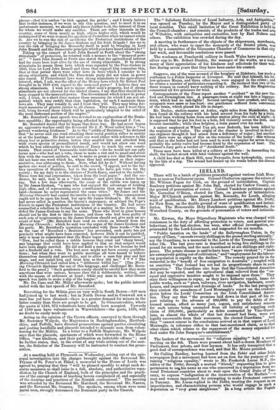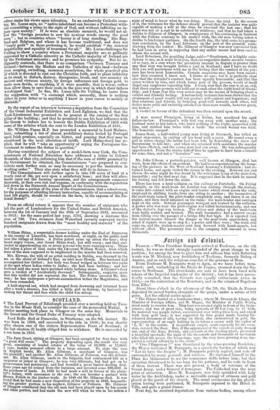IRELAND.
There will be a batch of petitions presented against various Irish Mem- bers as soon as Parliament opens. Colonel Chatterton opposes the return of Mr. William Fagan for Cork, on the ground of intimidation. Captain Bunbury petitions against Mr. John Ball, elected for Carlow County, on the ground of personation of voters. Colonel Vandeleur petitions against Mr. Cornelius O'Brien, elected for Clare, on grounds of intimidation. Major M'Clintock petitions against Mr. Kennedy, for Louth, alleging want of qualification. Mr. Heury_Lambert petitions against Mr. Duffy, for New Row, on the double ground of want of qualification and intimi- dation. The Honourable Holy Hutchinson opposes Mr. Esnionde, for Waterford County, on the grounds of personation of voters and intimida- tion.
Mr. Kirwan, the Mayo Stipendiary Magistrate who was charged with remissness in the duty of affording protection to voters, and general mis- behaviour, at the last election, has been, after official investigation, re- primanded by the Lord-Lieutenant, and suspended for six months.
"Public taxation on the lands" of the Ballyvaughan Union, in the county of Clare, "exceeds twenty shillings in the pound sterling annually," say the Guardians, in a memorial to the Lords of the Treasury, dated Oc- tober 7th. The last poor-rate is described as being five shillings in the pound for six months, and the next is estimated at six shillings and eight. pence. The potato disease is said to have been "more virulent" ; "lands are extensively getting out of cultivation," and "employment for the labour- ing population is rapidly on the decline." The remedy prayed for in the memorial is the "benefit of free emigration to Australia" ; coupled with an assertion "that Ireland has not had its proportionate share in such emigration." The Guardians also hope that the Consolidated Annuities Act may be repealed, and the agricultural class relieved from the "un- equal and oppressive taxation sought to be imposed upon them." They state their willingness to repay, as they have hitherto repaid, loans for public works, such as "piers, railways, river navigation, harbours, court- houses, and improvement and drainage of lands." In the last paragraph they contest the soundness of Lord Monteagle's report on the evidence given before the Lords' Committee on the Irish Consolidated Annui- ties. They say that "the premises laid down in that part of his re- port relating to the advance of 300,0001. to pay the debts of dis- tressed unions, afford so many just, cogent, and satisfactory reasons for such unions being exempted from all liability of repaying such claim of 300,0001., particularly as debts contracted by Vice-Guard- ians, as almost the whole of that last demand had been, were not legally recoverable from their successors, the elected Guardians." And they "cannot concur in the conclusions arrived at in that report of Lord Monteagle, in reference either to that last-mentioned claim, or to that other claim which relates to the repayment of the money expended for food under Sir John Burgoyne's establishment."
The leaders of the movement for "religious eqUality" held a secret meeting on the 8th. There were present about half-a-dozen Members of Parliament, four priests, and four laymen. It has only transpired that a good deal of correspondence was read, and that Mr. Moore presided. Sir Culling Earclley, having learned from the Tablet and other Irish newspapers that a movement had been set on foot for the purpose of ob- taining "religious equality," wrote to Mr. Frederick Lucas M.P., the editor of the Tablet, through a mutual "friend," requesting him to give permission to us il his name as one who concurred in a deputation from se- veral Protestant countries about to wait upon the Grand Duke of Tus- cany, to express "indignation at the incarceration of the Medias "—a man and woman imprisoned for attempting to make Protestant converts in Tuscany. Mr. Lucas replied in the Tablet, treating the request as an impertinence, and characterizing persons who would engage in such a deputation as " vely great simpletons." In a long article the Popish editor States his vies upon tolortition. In an exclusively Catholic coun- try, Mr. Lucas says, no 'native inhabitant can become a Protestant with- out committing a crime in the sight of God, and without infficting an in- jury upon society." If he were an absolute monarch, he would not al- low the "foreign preacher to sow his noxious weeds among the good corn" ; but in countries where "heresy is of long standing," like Eng- land and Belgium, and where it has become traditional, and does not imply guilt" in those professing it, he would establish "the strictest impartiality and equality of treatment for all." Mr. Lucas challenges Sir Culling to show a country where a Protestant majority are so galhngly oppressed by a Catholic minority as the Catholic majority Of Ireland are by the Protestant minority; and he promises his sympathy. But he in- dignantly contends, that there is no comparison "between Tuscany and Ireland—between the Madiais and the Catholics of this land—between your souping, swindling, mammon proselytism, the whole practical aim of which is directed to robt out the Christian faith, and to plant infidelity in its stead, to disturb, destroy, disorganize break, and tear asunder an ancient and virtuous society, by foreign influences anct foreign gold, to make men devils, or anything, if it were passible, that is worse, rather than allow them to save their souls in the pure way in which their fathers 'worshipped God." In fine, Mr. Lucas tells Sir Culling, he turns from the suggestion with "a contempt which, assuredly, there is nothing either in your letter or in anything I know in your career to modify or diminish."
By the report of an interview between a deputation from the Committee of the Great Industrial Exhibition and Lord Eglinton, we find that the Lord-Lieutenant has promised to be present at the raising of the first pillar of the building; and that he promised to use his best influence with the Queen to induce her to honour the Dublin Exhibition of 1863 with some 9f the articles which she sent to the London Exhibition of 1851.
Mr. William Fagan M.P. has presented a memorial to Lord Malmes- Wary, submitting a list of almost prohibitory duties levied by Portugal upon Irish produce, especially on butter, and praying that they may be considered in the next alteration'of tariffs. Lord Malmesbury has re- plied, that he will "take an opportunity of urging the Portuguese Go- vernment to reduce the &idea in question." Having considered the subject of a model-farm near Cork, the Com- missioners of National' Education have 'addressed a letter to Colonel Beamish, of that city, informing him that if the sum of 4000/. promised by the Government be obtained, the Commissioners "are prepared to con- tribute such farther sum as may be necessary to putthe institution in working 'order." They also state what they will do in future "The Commissioners will- further agree to take-120 acres of land at a yearly rent of 30s. per acre upon a satisfactory lease; and they will after- wards carry out the farming operations, and the arrangements connected therewith, at their own risk and expense, in conformity with the regulations laid down in the Sixteenth Annual Reportof the Cominissioners. "It is also a portion of the plan of the Commissioners, that a school-room, for the purposes of affording literary instruction, capable of accommodating at least-I90 pupils, should...be erected on the farm, -at the expense of the Na-
fiend-Boat:04 '
From an official return it appears that the number of emigrants who left the port of Londonderry for the United States, and British America, between the 1st of January and the 30th of September 1852, amounted to 5015.; for the same period last year,. 5795, showing a decrease this year of '780. Two steamers from Waterford recently conveyed twelve hundred emigrants drawn from the "most healthy and stalwart" of the population.
William Shine' arespeetable farmer holding under the Earl of Dunraven in the county of Limerick, has been murdered, at night, on the public road near the .village of *dare. A Police patrol came up about the time; they heard angry voices, and .found" Shine dead, but still warm; and they suc- ceeded in apprehending eix or 'seven pirsons who were running away. Shine had taken a piece of land- ender the reverend William Waller, from which some of.the men' supposed Jo be implicated in the.murder had been removed. Mrs. Kirwan, the wife of an artist residing in Dublin, was drowned in the sea on the shore of. Ireland's Eye in islet near Howth. Her husband had accompanied her thither; her body was found wedged in between two rocks at the spot where ladies retire to bathe; she had been bathing; and her husband said she must have perished while bathing alone. A Coroner's Jury gave a verdict of "Accidentally drowned." Subsequently, suspicion arose that this verdict did not represent the fact. The Police arrested Mr. Kir- wan ;- -he has undergone a private:examination before the Magistrates, and
has been remanded. •
A half-starved 'cat; which-had escaped from drowning and returned home after a week's absence, has killed a little girl in Galwtty, by furiously at tacking her throat and. face while the child was asleep.



























 Previous page
Previous page